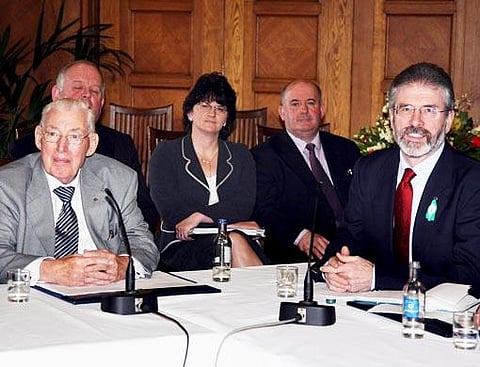Peace processes that won the Nobel Prize
Has highlighted fragile peace processes several times in the past

Oslo: The Nobel Peace Prize awarded on Friday to Colombian President Juan Manuel Santos despite a popular rejection of the terms of his deal with FARC [Revolutionary Armed Forces of Colombia — People’s Army] rebels has highlighted fragile peace processes several times in the past.
Santos and FARC guerrilla chief Rodrigo Londono reached a historic deal after almost four years of talks, but Colombians rejected it in a referendum, leaving the country’s more than 50-year-old civil war unresolved.
Here is a list of peace processes that won the Nobel Prize in the past.
1998: Northern Ireland
Two key figures in the Northern Ireland peace process, David Trimble, a Protestant from the pro-British Ulster Unionists (UUP), and John Hume, of the mainly Catholic Social Democratic and Labour Party (SDLP), won in October 1998 for their efforts to solve three decades of troubles that had killed almost 3,600 people. In April 1998, the Good Friday peace agreement had been reached by Belfast, Dublin, London and representatives from the Catholic and Protestant communities.
1996: East Timor
Catholic bishop Carlos Ximenes Filipe Belo and pro-independence leader Jose Ramos Horta won the prize for their efforts to end a bitter conflict that had killed tens of thousands of people in the former Portuguese colony that had been annexed by Indonesia in 1976.
Jakarta slammed the choice and in mid-1999 it actively backed militias who rejected the results of a UN-sponsored referendum in which an overwhelming majority voted for independence. A peacekeeping mission led by Australia ended the violence, but not before as many as 2,000 more people had died.
East Timor was recognised internationally as an independent state in May 2002.
1994: Middle East
Palestine Liberation Organisation (PLO) chief Yasser Arafat, Israeli premier Yitzhak Rabin and his foreign minister Shimon Peres won the award for their efforts to reach peace in the Middle East.
Their work led to the September 1993 Oslo Accord that laid the foundation for Palestinian autonomy and was immortalised by a historic handshake between Arafat and Rabin, formerly bitter enemies.
The committee’s decision to give the award to Arafat despite his involvement with the PLO, considered by many a terrorist organisation, prompted the resignation of five members of the Nobel award committee.
All three laureates have since died, or been assassinated in the case of Rabin, and the Israeli-Palestinian peace process is now essentially null and void.
1993: The end of apartheid
Two key figures in the abolition of South Africa’s racist apartheid system, Nelson Mandela and president F.W. de Klerk, won the prize in 1993 for putting South Africa on the path toward becoming a multiracial democracy.
In February 1990, De Klerk authorised the release of Mandela from prison, where he had spent 27 years. The decision was accompanied by the abolition of apartheid and led to the country’s first multiracial elections in 1994, which Mandela won to become president in turn.
1978: Camp David accord
Egyptian president Anwar Sadat and Israeli prime minister Menachem Begin won in 1978 after they signed the Camp David accord that led to a peace treaty between the two countries after almost 30 years of conflict.
Sadat had made a historic visit to Jerusalem in November 1977, and in 1979 he became the first Arab head of state to sign a peace treaty with Israel. He paid for it with his life when he was assassinated in October 1981.
1973: US withdrawal from Vietnam
The prize went that year to US secretary of state Henry Kissinger and the head of the North Vietnamese communist party, Le Duc Tho, after they signed the Paris Peace Agreement in January 1973 that led to a US withdrawal from South Vietnam.
The war continued however until North Vietnamese forces and Vietcong guerrillas captured the southern capital Saigon in April 1975.
Le Duc Tho refused the honour, and Kissinger offered to return his medal.
For the first time in the history of the Peace Prize two committee members resigned to protest the award.



